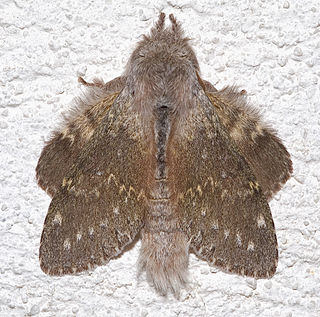Related Research Articles
Tissue may refer to:

Lepidoptera is an order of insects that includes butterflies and moths. About 180,000 species of the Lepidoptera are described, in 126 families and 46 superfamilies, 10 per cent of the total described species of living organisms. It is one of the most widespread and widely recognizable insect orders in the world. The Lepidoptera show many variations of the basic body structure that have evolved to gain advantages in lifestyle and distribution. Recent estimates suggest the order may have more species than earlier thought, and is among the four most speciose orders, along with the Hymenoptera, Diptera, and Coleoptera.

Moths are a paraphyletic group of insects that includes all members of the order Lepidoptera that are not butterflies, with moths making up the vast majority of the order. There are thought to be approximately 160,000 species of moth, many of which have yet to be described. Most species of moth are nocturnal, but there are also crepuscular and diurnal species.

Bombyx mori, the domestic silk moth, is an insect from the moth family Bombycidae. It is the closest relative of Bombyx mandarina, the wild silk moth. The silkworm is the larva or caterpillar of a silk moth. It is an economically important insect, being a primary producer of silk. A silkworm's preferred food are white mulberry leaves, though they may eat other mulberry species and even the osage orange. Domestic silk moths are closely dependent on humans for reproduction, as a result of millennia of selective breeding. Wild silk moths are different from their domestic cousins as they have not been selectively bred; they are thus not as commercially viable in the production of silk.

Hornbeams are hardwood trees in the flowering plant genus Carpinus in the birch family Betulaceae. The 30–40 species occur across much of the temperate regions of the Northern Hemisphere.

Ypsolophidae is a family of moths with some 160 species. They are included in the Plutellidae by many authors.

Rebirth of Mothra is a 1996 Japanese kaiju film directed by Okihiro Yoneda and written by Masumi Suetani. Produced and distributed by Toho Studios, the film serves as a reboot for the fictional giant monster character Mothra, and is the first installment in the Rebirth of Mothra trilogy. It was the final kaiju film produced under the supervision of Tomoyuki Tanaka, who produced such films as the original Mothra, which was released in 1961, as well as every film in the Godzilla franchise up to this point. He died of a stroke several months after the film's release.

Norman Barnett Tindale AO was an Australian anthropologist, archaeologist, entomologist and ethnologist.

The Insect-class gunboats were a class of small, but well-armed Royal Navy ships designed for use in shallow rivers or inshore. They were intended for use on the Danube against Austria-Hungary. The first four ships—Gnat, Mantis, Moth and Tarantula—were first employed during the World War I Mesopotamian Campaign on the Euphrates and Tigris rivers.

The Moth a small development class of sailing dinghy. Originally a small, fast home-built sailing boat designed to plane, since 2000 it has become an expensive and largely commercially-produced boat designed to hydroplane on foils.

The de Havilland DH.60 Moth is a 1920s British two-seat touring and training aircraft that was developed into a series of aircraft by the de Havilland Aircraft Company.

The DH.83 Fox Moth was a successful small biplane passenger aircraft from the 1930s powered by a single de Havilland Gipsy Major I inline inverted engine, manufactured by the de Havilland Aircraft Company.

The lobster moth, also known as lobster prominent, is a moth from the family Notodontidae. The species was first described by Carl Linnaeus in his 10th edition of Systema Naturae. The English name refers to the crustacean-like appearance of the caterpillar.

Abraxas sylvata, the clouded magpie, is a moth of the family Geometridae that was named by Giovanni Antonio Scopoli in 1763.

Eupoecilia ambiguella, the vine moth, is a moth of the family Tortricidae. It is found in Europe, China, India, Japan, Korea, Mongolia and the Russian Far East.

HMS Moth was an Insect-class gunboat of the Royal Navy. Entering service in 1916, Moth had a varied career with service in the Middle East, the White Sea and the Far East in two world wars. Scuttled in World War II during the invasion of Hong Kong, the ship was raised and put into service by the Imperial Japanese Navy as Suma (須磨). The ship remained active throughout the war, before striking a naval mine in the Yangtze River in 1945 and sinking.

Autosticha is a genus of gelechioid moths. It belongs to the subfamily Autostichinae, which is either placed in the concealer moth family (Oecophoridae), or in an expanded Autostichidae. It is the type genus of its subfamily. Originally, this genus was named Automola, but this name properly refers to a fly genus in family Richardiidae.

Miraculous: Tales of Ladybug & Cat Noir is a computer-animated superhero television series produced by French studios Zagtoon and Method Animation in collaboration with De Agostini Editore S.p.A. in Italy, Toei Animation in Japan, SAMG Animation in South Korea and Canais Globo in Brazil. The series features two Parisian teenagers, Marinette Dupain-Cheng and Adrien Agreste, who transform into the superheroes Ladybug and Cat Noir, respectively, to protect the city from supervillains.

Konchuuki is a studio album by the Japanese noise musician Merzbow. It was released on August 11, 2015 by the Brazilian label Essence Music in standard and deluxe editions, and is his third release for the label.
References
| This article on a moth of the subfamily Gelechiinae is a stub. You can help Wikipedia by expanding it. |